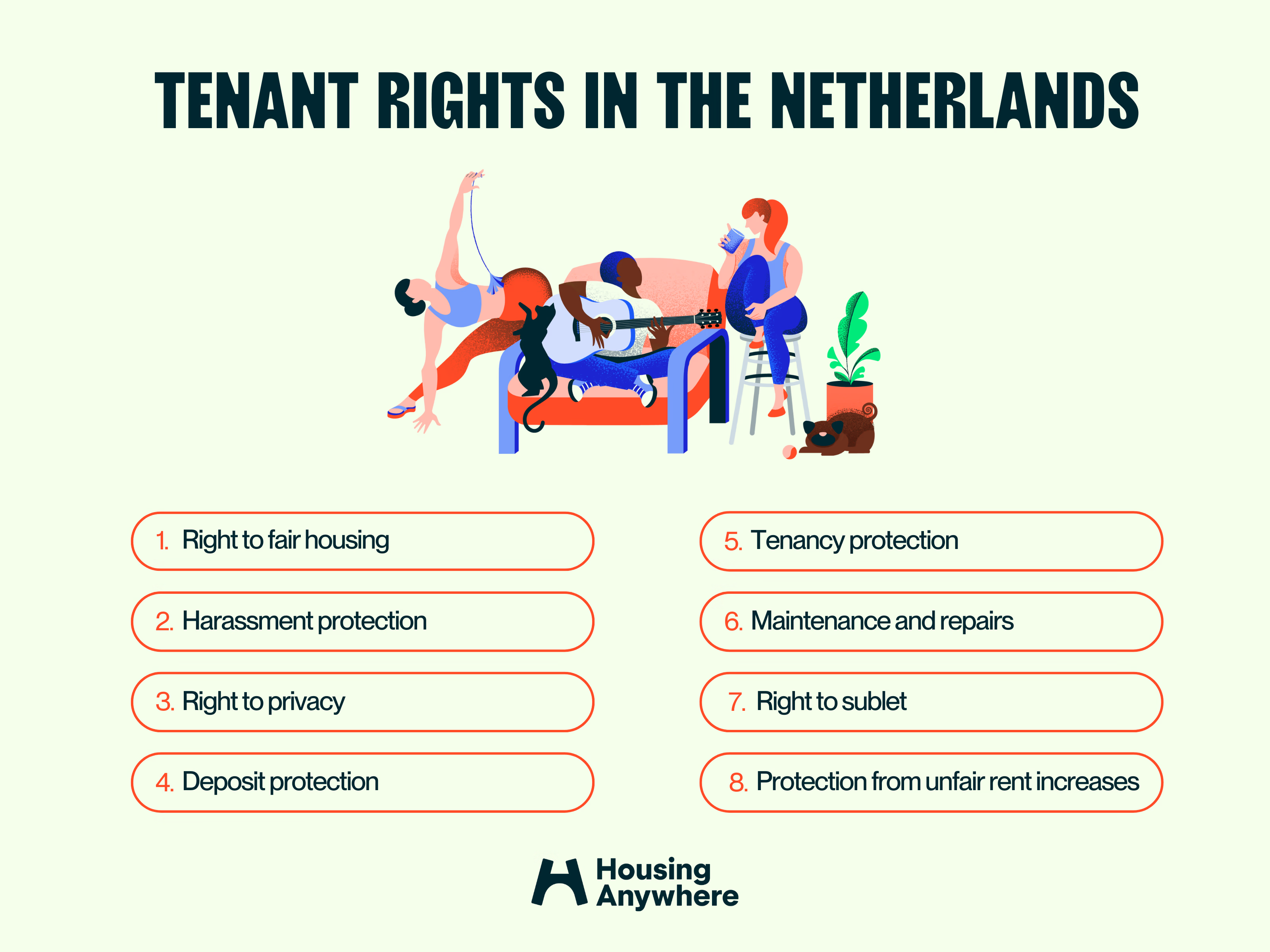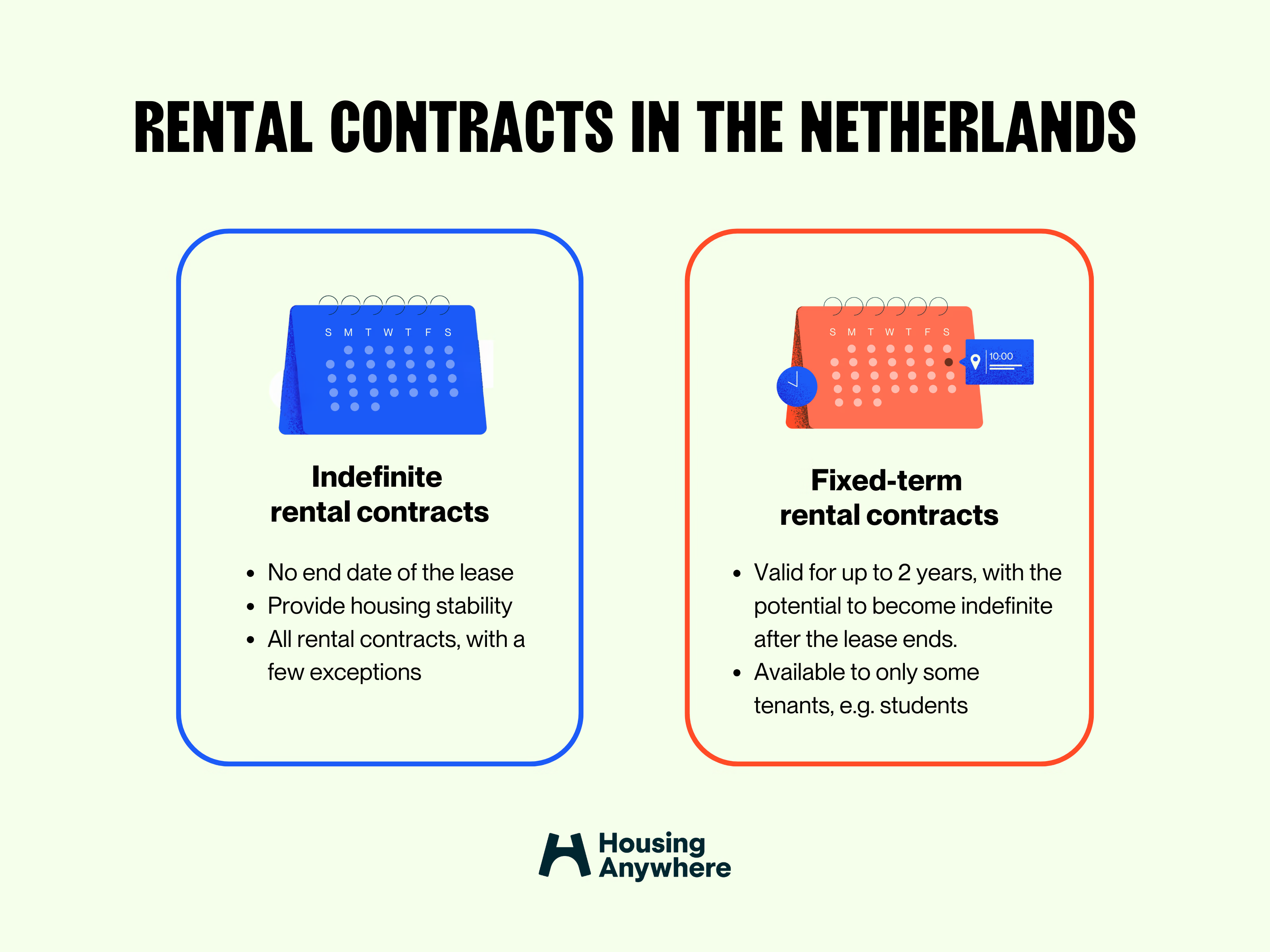Renter’s guide to tenant rights in the Netherlands
What are your rights as a tenant in the Netherlands? Learn about the Dutch rental law, indefinite rental contracts, and evictions with our guide.
Ivandzhelin
Knowing your tenant rights is important when you’re renting in the Netherlands. Dutch rental law protects you with strict rental regulations, deposit protections, and strong eviction safeguards. Understanding your tenant rights in the Netherlands rights, from maintenance duties to rent increases, will help you enjoy worry-free renting. Let’s break down the key tenant protections to help you understand your rights as a renter.
What are your tenant rights in the Netherlands?

As a tenant in the Netherlands, you’re entitled to important rights, even if they aren’t explicitly mentioned in your rental agreement. Under the Dutch rental law, your rights include:
Right to fair housing
The right to fair housing ensures everyone has equal access to safe, affordable, decent housing. When renting out properties, landlords can’t discriminate based on factors like nationality, race, religion, or gender.
The selection process needs to be clear and transparent. Landlords or property agents can’t ask you to disclose personal information such as ethnic background, sexual orientation, religious identity, political preference, or physical/mental health.
Protection against harassment and retaliation
Landlords can't make unreasonable demands, frequently enter the property without notice, or use intimidation to force you to leave the property. Additionally, landlords are prohibited from retaliating against tenants for exercising their legal rights, like disputing unfair rent increases or reporting maintenance issues.
Right to privacy
Dutch rental law prohibits landlords from entering the property while you’re renting it without your prior consent, except in emergencies. They must give proper notice if they need to access the property for repairs or inspections.
Right to a security deposit
Security deposits in the Netherlands are usually between 1-2 months' rent, and they are returned to you within 14 days of the end of the rental agreement. Security deposits are used to cover any property damages that have occurred as a result of your tenancy and additional service or energy charges.
The landlord has to inform you of the security deposit amount and the conditions under which you’ll be refunded the deposit at the end of the tenancy. If the landlord withholds a portion of your security deposit, they must inform you in writing about the costs and return the rest within 30 days.
Tenancy protection
According to tenant rights in the Netherlands, renters with indefinite rental contracts are protected against lease termination. Your landlord can’t end the lease without a valid reason. Regardless of whether you’re renting an apartment, house, or just a room, the rental protection applies to you. Rental protections also extend to the people you’re living with, be it a roommate or a partner.
Maintenance and repairs
Landlords are responsible for maintaining the property in good condition and carrying out major repairs. Tenants are only responsible for minor repairs, such as replacing light bulbs or maintaining the garden. If landlords neglect their maintenance duties, tenants can request repairs or, in severe cases, request rent reductions.
Right to sublet
Tenants may sublet their property, but only with the landlord’s permission. Unauthorized subletting can lead to eviction.
Protections from unfair rent increases
Tenants are protected from excessive annual rent increases. Landlords must follow government guidelines, and increases must be reasonable and announced in writing.
Rental agreements in the Netherlands
One of your tenant rights in the Netherlands is to have a written rental agreement that outlines your rights and obligations regarding the property. A rental contract in the Netherlands typically includes:
- Names and signatures
- Monthly rent and payment terms
- Security deposit amount
- Rent increases
- Property description and inventory
- Start and end dates of the lease
- House rules
- Utilities and extra costs (if applicable)
- Landlord responsibilities
- Notice period for termination of the lease
If your utilities or service costs are included in the rent, the rental agreement has to breakdown the additional charges.
Types of rental contracts in the Netherlands

There are 2 types of rental contracts in the Netherlands: indefinite and fixed. In most cases, you’ll be offered an indefinite contract. Let’s see what makes them different.
Indefinite rental contracts
From 1 July 2024, tenants can only be offered indefinite rental contracts in the Netherlands. These new changes state that the renter’s right to receive a rental contract with no end date. Landlords can’t end indefinite contracts without a lawful reason or harass tenants to move out. The new rental laws in the Netherlands aim to provide tenants with fair housing and remove the pressure of having to move out every few years.
Fixed-term rental contracts
Fixed-term contracts have an end date and are often valif for a maximum of 2 years. They can become indefinite after the end of the term. While fixed-term contracts aren't allowed anymore, there are some exceptions. You can sign a fixed-term contract if:
- You're a student renting temporarily
- You need to live elsewhere while your house is being renovated
- You’re moving from social housing or are in a social emergency
- You’re a tenant given a second chance after your previous lease was terminated for breaking its terms
Is there rent control in the Netherlands?
Yes, the Netherlands has a system to control the cost of rental accommodation. Whether a property is classified as rent-controlled or liberalized depends on the property’s Woningwaarderingsstelsel (WWS), also known as the points system.
This system scores a property based on which scores the property based on size, facilities, and location to ensure the rent matches the property’s value. The total score determines whether it falls below or above the liberalization threshold.
Rent-controlled units
Based on the points system, rent-controlled units (social housing) fall under the liberalization threshold. As such, they’re typically more affordable, and the government determines how much their rent is. In 2024, the rent cap for rent-controlled units in the Netherlands is €879.66 monthly. These properties are typically aimed for low-income tenants and have strict eligibility requirements.
If your monthly base rent is below €879.66 you might be eligible for the Dutch rental allowance which covers a portion of your rent.
Liberalized units
Liberalized units (private sector units) have rents above the liberalisation threshold, meaning they are free from government regulation regarding the basic rent. These units are more common in the private sector and often cater to higher-income earners or expats. They offer more flexibility in terms of tenancy agreements but come with fewer tenant protections compared to rent-controlled housing.
Annual rent increases
The government regulates annual rent increases in the Netherlands. These increases are capped and typically tied to inflation and household income. In 2024, the maximum rental increase for rent-controlled units is 5.8%, whereas the rent cap for properties in the private sector is 5.5% annually.
When can a landlord evict a tenant in the Netherlands?
In the Netherlands, a landlord can only evict a tenant under specific, legally valid circumstances, such as:
- Non-payment of rent
- Breach of contract
- Major renovation or demolition
If a landlord seeks to evict a tenant, the case must go to court, where the tenant has the right to defend their position. Tenants can present their arguments or disputes regarding the eviction in court. Tenants can appeal an eviction in the Netherlands in a higher court.
During the legal process, tenants can't be forcibly evicted without a court order, ensuring they have an opportunity to appeal and have their case reviewed.
What to do if my landlord won’t fix things in the Netherlands?
Generally, it’s best to try to resolve the issue between you and your landlord. But if you’ve send a formal repair request and they haven’t resolved the problem you can contact the Rent Team (Huurteam) of your city. This is a free service that offers advice and can negotiate with your landlord on your behalf. If the problem persists they can file a complaint with the Rent Tribunal ( Huurcommissie), which can enforce repairs. You can contact them in other cases as well, such as unfair rent increases and high rent or service charges.
This article is for informational purposes only.
Please reach out to content @housinganywhere.com if you have any suggestions or questions about the content on this page. For legal advice or help with specific situations, we recommend you contact the appropriate authorities.
Related articles
In this article
What are your tenant rights in the Netherlands?
Rental agreements in the Netherlands
Types of rental contracts in the Netherlands
Is there rent control in the Netherlands?
Annual rent increases
When can a landlord evict a tenant in the Netherlands?
What to do if my landlord won’t fix things in the Netherlands?
Find your next home in the Netherlands
Find accommodation in cities across the Netherlands. Search for your accommodation now!
Start my Search

